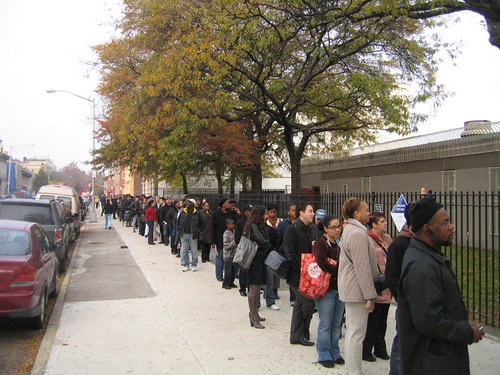By Feet in Two Worlds reporter Aswini Anburajan
Of all the questions and fascinating possibilities raised by the 2008 election, one of the least pondered has been this: Will immigrants and ethnic minorities as a whole ever find a home in the Republican Party?
To put it another way, will the Republican Party embrace minority voters? Or do the desires of these voters and the GOP platform differ too widely to build a relationship between the two?
Here’s why this question matters: demographics. By 2050 the United States will be a majority minority nation, per projections by the Census Bureau. The impact of that demographic shift is already being felt politically, most significantly in the West where Latino voters have allowed Democrats a chance to win in states where they have struggled to be competitive in recent presidential elections.
A study from the William C. Velasquez Institute found that without Latino support in Nevada, Colorado and New Mexico, Obama’s lead in those states would either disappear or fall within the margin of error.
Latinos and Asians, especially those who are immigrants or the children of immigrants, are either solidly Democratic or trending that way. Newly naturalized voters are also voting Democratic. In this election that might make sense for several reasons: immigrant voters want change. Many voters, who aren’t white, also feel a kinship with Barack Obama. The closest we’ve come to such an ethnic identification may be John F. Kennedy and Irish Americans in the sixties.
But what about future elections? Will these voters be voting Democratic in 2010 and 2012 too?
The answer is most likely yes, for three reasons. First, and most important, is the problem minority voters have with the Republican brand. Republican opposition to immigration reform and movements like the Minute Men have reinforced the idea that the GOP is hostile to voters who aren’t white.
The second reason these voters may continue to vote Democratic is because the Democratic Party reached out to them in 2006 and again in 2008. The Obama Campaign in particular has focused on creating a grassroots army of Latino voters in the West, and has well-coordinated fund-raising programs throughout the country with Asian donors, many of whom are immigrants or the children of immigrants. These voters have now participated – and will most likely continue to participate – by running for office, working on future campaigns, and lobbying for their issues. If Democrats continue to be open to these voters and the issues they care for, then it’s likely that they will continue to vote Democratic.
Third, a study by the Immigration Policy Center says that children of immigrants will be a crucial voting bloc, not just in this election, but in future elections as well. Many of these children were born in the United States to undocumented parents. Their political identity, for better or for worse, may be shaped by what happens to their parents and their legal status.
It was reported in the past month that conservatives, regardless of who wins the White House, are planning a strategic retreat in Virginia after the election to decide on the future of a party that has already been badly damaged. The goal some conservatives have said is to see how the party can rebuild a national grassroots network in the way they did after the Carter victory.
But who will that new party and grassroots movement include?
A recent article by Pat Buchanan on RealClear Politics argued that with Democrats in control of the White House and Congress, they would pass immigration reform and flood the country with new citizens, all of whom would vote Democrat and leave regions, such as the West, completely out of reach of Republicans.
But perhaps Buchanan is suffering from a little inside –the-beltway myopia. The converse of that argument is that a flood of new citizens could provide both parties a pool of new voters to choose from. These voters, unlike those who have been born and raised in the United States, don’t have an ingrained party identification or set of stereotypes to associate with either Democrats or Republicans. This argument that was underscored by a recent survey of Indian American voters conducted by the Campaign for America’s Future.
Latinos were seen as Republican voters in 2004, won over by Republican outreach efforts that stressed a shared vision of the American dream and similar social values. Many Asian Americans also voted Republican, motivated by the desire for lower taxes and the message of personal responsibility. It’s only been in the past four years that these ethnic groups have made a significant shift to, or back to, the Democratic Party.
Rather than shy away from immigrant voters, the Republican Party, with its emphasis on conservative social values and the power of individual entrepreneurship, could win these voters over with the right arguments. In terms of sheer population their strength as a party may depend upon it. But they must be willing to demonstrate that the GOP is open to immigrants. Support for comprehensive immigration reform would be a step in that direction.







